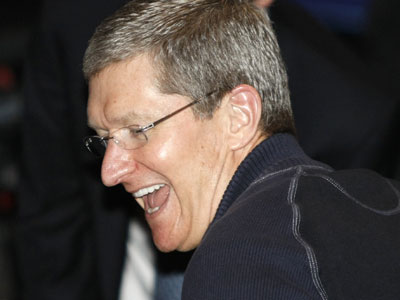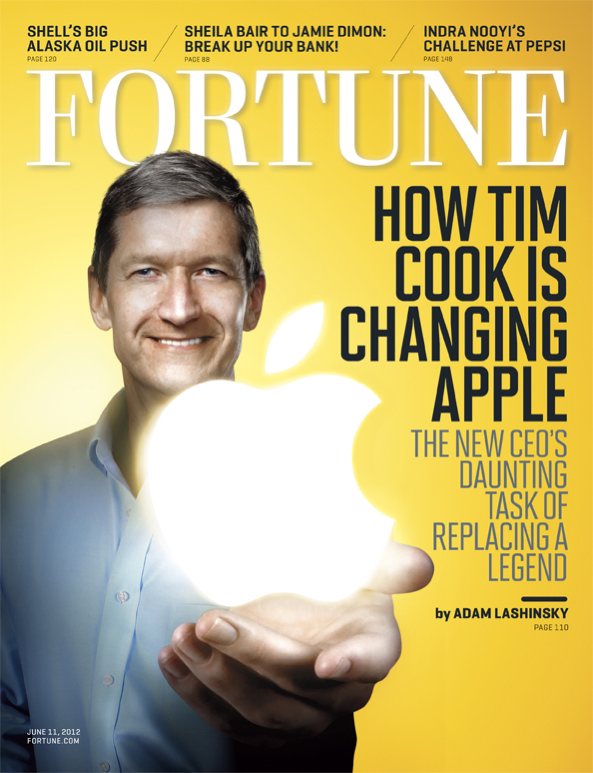Fortune Magazine has Tim Cook on the cover of the June 11 issue with Editor-at-large Adam Lashinsky’s feature under the headline How Tim Cook is Changing Apple.
Not only does the cover photo look fabulous, the story itself offers previously unknown details behind Steve Jobs’ successor.
One of my favorite highlights: Cook often sits with random employees at lunch.
So, what’s Cook been up to, how about the driving force behind his management style and just how effective he’s been at replacing a legend…
According to an excerpt over at Fortune, Cook is determined to put his own stamp at Apple rather than be content living under the shadow of his predecessor, the late co-founder and CEO Steve Jobs.
Some of his moves “will court controversy with the Apple faithful”, Lashinsky writes, because “he doesn’t apologize for charting a new course”.
Cook asked employees in a speech at a special ceremony in Cupertino dedicated to honoring the life of Steve Jobs that they honor one of Jobs’ dying requests, “that Apple’s management not ask “What would Steve do?” and instead do what’s best for Apple”.
Be that as it may, Apple’s inevitably changing from a Steve Jobs-focused company to a more regular corporation abiding to some of the rules of business world that Jobs just loved to break.
For example, acting under tremendous pressure from the investment community, Cook and the Apple board greenlighted a dividend and share repurchase program.
The deal would have hardly went through under Jobs’s watch as Apple had not been paying a cash dividend since 1995.
Some other signs that Apple is becoming a more normal company.
When Adrian Perica, a former Goldman Sachs banker, joined Apple several years ago, he was the only executive whose sole remit was dealmaking. Steve Jobs basically ran mergers and acquisitions for Apple.
Today Perica heads a department with three corporate-development professionals under him and a staff supporting them, so that Apple can work on three deals simultaneously.
Here’s the cover of the June 11, 2012 issue.
You gotta love the Photoshop job…
In what some might deem a worrying sign, Lashinsky cites a former employee who observes that “Apple is becoming “far more traditional”, meaning more MBAs, more process, and more structure.
Max Paley, a former engineering vice president who worked at Apple for 14 years until late 2011, is also quoted:
It looks like it has become a more conservative execution engine rather than a pushing-the-envelope engineering engine. I’ve been told that any meeting of significance is now always populated by project management and global-supply management.
When I was there, engineering decided what we wanted, and it was the job of product management and supply management to go get it. It shows a shift in priority.
This was to be expected.
Some other highlights:
• Cook has huge respect for Facebook, “with which Apple could work more closely”
• as for Amazon, Cook deems it “a different kind of competitor” that has “different strengths” from Apple and that “will sell a lot” of Kindles
• he used to work at a paper mill in Alabama and an aluminum plant in Virginia
• he vacations at the Canyon Ranch resort in Arizona, where guests who have seen him there say he keeps to himself, often dining alone, reading on his iPad
• during a meeting with large investors at Apple’s Town Hall conference room, one of the investors said Cook “was in complete control and knew exactly who he was and where he wanted to go, he answered every question head-on and didn’t skirt any issue”
Cook, 51, is a detail-oriented executive whose love for spreadsheets is legendary, as is his penchant for operational efficiencies.
During his tenure as Apple’s operations chief, Cook was largely attributed with running the trains on time while reducing Apple’s inventory from weeks and months to days.
“Inventory is fundamentally evil”, he used to say.
And it’s exactly these traits that Apple needs at this critical juncture in its history.
But even though it’s still business as usual at Apple, I think we can all agree the company is in fact changing and becoming more of a ‘normal’ American corporation.
Let’s just hope that Cook knows what he’s doing and that all those new managers and hire-ups and corporate structure won’t kill the creativity process and turn Apple into yet another committee-driven gadget maker.
Here’s my advice to Cook: pay attention to what had happened to Sony.
The big question remains unanswered: how will fans respond to this new, more normal Apple?
Thoughts?

